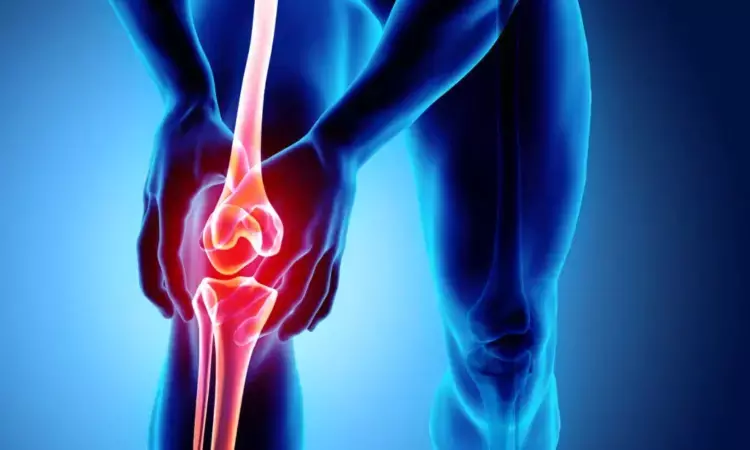- Home
- Medical news & Guidelines
- Anesthesiology
- Cardiology and CTVS
- Critical Care
- Dentistry
- Dermatology
- Diabetes and Endocrinology
- ENT
- Gastroenterology
- Medicine
- Nephrology
- Neurology
- Obstretics-Gynaecology
- Oncology
- Ophthalmology
- Orthopaedics
- Pediatrics-Neonatology
- Psychiatry
- Pulmonology
- Radiology
- Surgery
- Urology
- Laboratory Medicine
- Diet
- Nursing
- Paramedical
- Physiotherapy
- Health news
- Fact Check
- Bone Health Fact Check
- Brain Health Fact Check
- Cancer Related Fact Check
- Child Care Fact Check
- Dental and oral health fact check
- Diabetes and metabolic health fact check
- Diet and Nutrition Fact Check
- Eye and ENT Care Fact Check
- Fitness fact check
- Gut health fact check
- Heart health fact check
- Kidney health fact check
- Medical education fact check
- Men's health fact check
- Respiratory fact check
- Skin and hair care fact check
- Vaccine and Immunization fact check
- Women's health fact check
- AYUSH
- State News
- Andaman and Nicobar Islands
- Andhra Pradesh
- Arunachal Pradesh
- Assam
- Bihar
- Chandigarh
- Chattisgarh
- Dadra and Nagar Haveli
- Daman and Diu
- Delhi
- Goa
- Gujarat
- Haryana
- Himachal Pradesh
- Jammu & Kashmir
- Jharkhand
- Karnataka
- Kerala
- Ladakh
- Lakshadweep
- Madhya Pradesh
- Maharashtra
- Manipur
- Meghalaya
- Mizoram
- Nagaland
- Odisha
- Puducherry
- Punjab
- Rajasthan
- Sikkim
- Tamil Nadu
- Telangana
- Tripura
- Uttar Pradesh
- Uttrakhand
- West Bengal
- Medical Education
- Industry
Groundbreaking Study Reveals Long-Term Benefits of Genicular Artery Embolisation for Knee Osteoarthritis Patients

UK: In a groundbreaking development, researchers have unveiled promising long-term results from a study investigating Genicular Artery Embolisation (GAE) as a treatment for osteoarthritis of the knee. The study, known as GENESIS (Genicular Artery Embolisation in Patients with Osteoarthritis of the Knee), showcases the durability and efficacy of this innovative approach in alleviating pain and improving function in patients with knee osteoarthritis.
The study, published in CardioVascular and Interventional Radiology, found that genicular artery embolization for mild-to-moderate knee osteoarthritis can lower pain for patients for up to two years.
Osteoarthritis (OA), the most common form of arthritis, affects millions worldwide, causing debilitating pain and limiting mobility, particularly in weight-bearing joints like the knees. Traditional treatment options, such as pain medications and physical therapy, often provide only temporary relief and may not address the underlying cause of the condition.
GAE is an emerging minimally invasive intervention for patients with painful knee OA refractory to other treatments or who are reluctant to undergo or ineligible for knee replacement surgery. The procedure involves microparticle insertion to target genicular arteries that supply the knee's synovial lining. These microparticles block blood flow, which reduces pain signals and provides relief.
Considering the above, M. W. Little, School of Psychology and Clinical Language Sciences, University of Reading, Reading, UK, and colleagues aimed to report the 2-year follow-up of patients with mild-to-moderate knee OA treated with genicular artery embolization as part of the GENESIS study.
Forty-six patients with a median age of 60 underwent GAE using permanent microspheres (100–300 μm). Technical success defined as the embolization of the targeted genicular arteries.
Visual Analogue Scale (VAS) (0–100 mm) and Knee Injury and Osteoarthritis Outcome Score (KOOS) were recorded at baseline, six weeks, three months, 1, and 2 years. Contrast-enhanced MRI knee scans were acquired at baseline and one year and assessed with the Whole-Organ Magnetic Resonance Imaging Score (WORMS).
The correlation between neuropsychological phenotypes and clinical outcomes was investigated through functional MRI brain imaging and psychometric assessments. Adverse events were recorded prospectively.
The study led to the following findings:
· 87% of the patients achieved technical success.
· Mean VAS improved from 58.63 at baselines to 37.7 at two years.
· Whole and subgroup KOOS were significantly improved at each time point with associated reductions in analgesia usage.
· WORMS analysis demonstrated a significant reduction in synovitis with no cases of osteonecrosis.
· Self-limiting skin discoloration occurred in four patients.
· A self-limiting groin hematoma and a single case of deep-vein thrombosis due to immobilization were also recorded.
· Nine patients subsequently underwent knee arthroplasty with no additional operational complexities identified.
· Neuropsychometric assessment elucidated a correlation between baseline catastrophizing and a greater reduction in pain post-GAE.
"For mild-moderate knee osteoarthritis, GAE is a safe intervention with sustained efficacy at two years," the researchers wrote. "These results are promising and justify ongoing controlled trials."
"Future studies should investigate longitudinal imaging changes, optimal embolic materials, biomarkers, and neuropsychological phenotypes to elucidate the ideal patient population for GAE," they concluded. "More work is also required on the OA severity and outcome following GAE, as related to the OA pathogenesis."
Reference:
Little, M.W., O’Grady, A., Briggs, J. et al. Genicular Artery embolisation in Patients with Osteoarthritis of the Knee (GENESIS) Using Permanent Microspheres: Long-Term Results. Cardiovasc Intervent Radiol (2024). https://doi.org/10.1007/s00270-024-03752-7
Dr Kamal Kant Kohli-MBBS, DTCD- a chest specialist with more than 30 years of practice and a flair for writing clinical articles, Dr Kamal Kant Kohli joined Medical Dialogues as a Chief Editor of Medical News. Besides writing articles, as an editor, he proofreads and verifies all the medical content published on Medical Dialogues including those coming from journals, studies,medical conferences,guidelines etc. Email: drkohli@medicaldialogues.in. Contact no. 011-43720751


